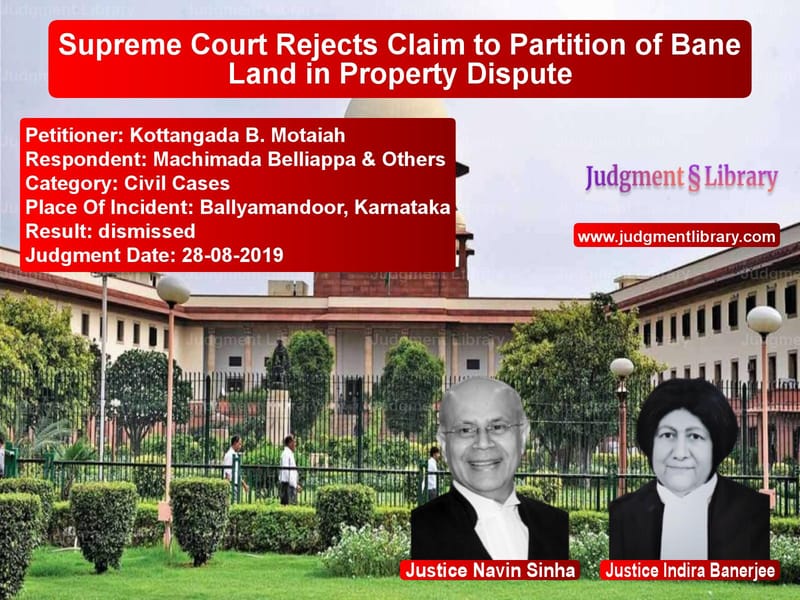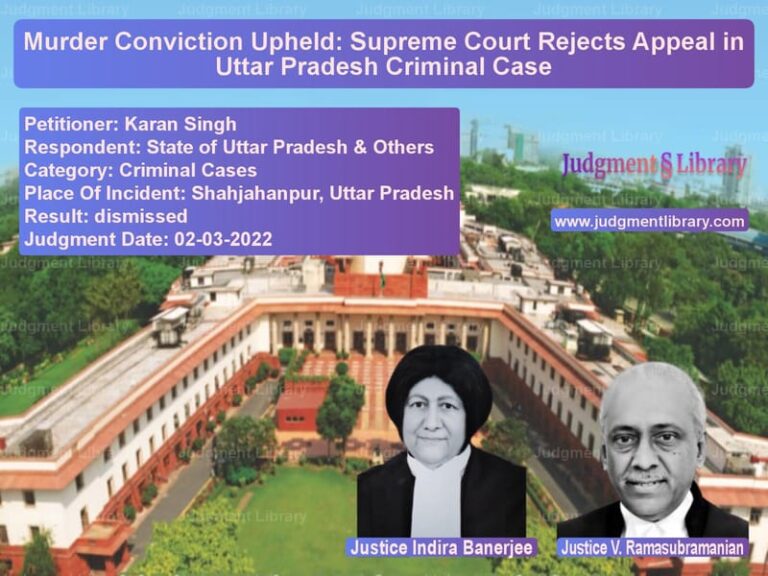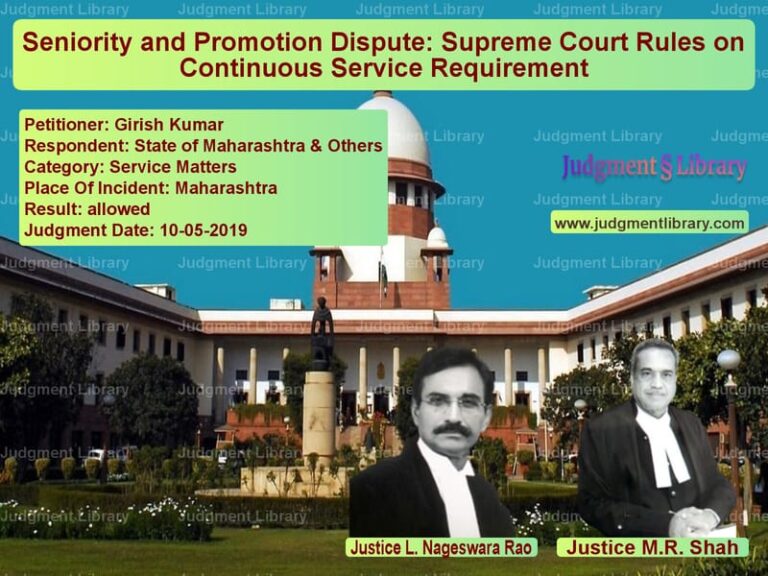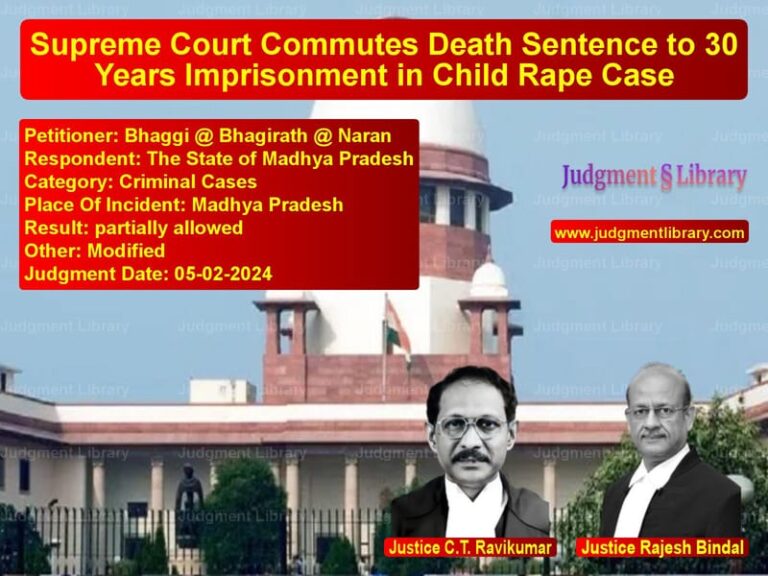Supreme Court Rejects Claim to Partition of Bane Land in Property Dispute
The case of Kottangada B. Motaiah v. Machimada Belliappa & Others revolves around a property dispute concerning the partition of ‘bane’ lands in Ballyamandoor village. The Supreme Court was called upon to decide whether the appellant, Kottangada B. Motaiah, had any legitimate claim to a share in the disputed property.
The appellant challenged the lower court’s decision, arguing that he had ownership and possession of certain wet lands, which entitled him to a proportionate share in the adjacent bane lands. However, both the trial court and the High Court found that he failed to prove his claim. The Supreme Court upheld these findings, dismissing his appeal.
Background of the Case
The dispute involved different branches of the same family claiming shares in family property. The respondents, as plaintiffs, filed a suit for partition against the appellant, alleging that he was in wrongful occupation of 10 acres of suit lands as an encroacher.
The key aspects of the case were:
- The plaintiffs claimed that the appellant had no legitimate ownership over the land and was merely an encroacher.
- The appellant, in response, asserted that he was the absolute owner of wet lands in Ballyamandoor village and thus entitled to a proportionate share of the bane lands.
- The trial court ruled against the appellant, stating that he failed to establish possession of any wet lands.
- The High Court upheld the trial court’s ruling, leading to the appeal before the Supreme Court.
Arguments by the Appellant
The appellant contended that:
- Bane lands could not be partitioned: He argued that these lands were not subject to division under general partition laws.
- Possession of wet lands: He claimed to be in possession of wet lands in survey nos. 180, 183, 179/1, and 179/2, entitling him to a share in the bane lands.
- Misinterpretation of evidence: The trial court wrongly construed his statements as an admission that he did not possess any wet lands.
- Legal question on partitionability: He asserted that the issue of whether bane lands could be partitioned was a legal matter that the Supreme Court could consider.
Arguments by the Respondents
The respondents (plaintiffs) countered the claims, stating that:
- The suit was maintainable: The Karnataka High Court had ruled in a prior full-bench decision (Machettira Machaiah & Others v. Machettira Kariappa & Another, AIR 1994 Karnataka 52) that such suits were legally permissible.
- The appellant had no possession: The trial court found that the appellant was not in possession of any wet lands in Ballyamandoor village.
- Other defendants had ownership: The land records showed that other defendants, not the appellant, were in possession of the wet lands.
- No claim of adverse possession: Unlike some other defendants, the appellant did not even claim ownership by adverse possession.
Key Observations by the Supreme Court
After reviewing the evidence and arguments, the Supreme Court made the following critical observations:
- Bane lands are assigned for beneficial use: The Court referred to the Coorg Revenue Manual, 1954, which states that bane lands are attached to private wet lands (warga lands) and are used for grazing, collecting firewood, and other agricultural benefits.
- The suit was legally valid: The Supreme Court upheld the full-bench Karnataka High Court ruling that partition suits involving bane lands were maintainable.
- The appellant admitted he had no possession: In his cross-examination, the appellant conceded that he was residing in Harihara village and that he had been allotted land in a family partition.
- No proof of wet land ownership: The appellant failed to present any documentary evidence proving that he owned or was in possession of any wet lands in Ballyamandoor village.
- Clear findings of lower courts: Both the trial court and the High Court had examined the evidence and found that the appellant had no valid claim.
Supreme Court’s Judgment
The Supreme Court upheld the concurrent findings of the lower courts and dismissed the appeal, stating:
“The appellant has completely failed to lead any evidence with regard to his being in possession of any wet lands in Ballyamandoor village so as to entitle him to a proportionate share in the schedule ‘bane’ lands.”
The Court found no reason to interfere with the findings, as they were based on a fair and reasonable assessment of the evidence.
Implications of the Judgment
This ruling has significant implications for property disputes, particularly involving bane lands:
- Partition suits involving bane lands are valid: The decision reaffirms the Karnataka High Court’s ruling that such suits are legally maintainable.
- Ownership claims require proof: A mere assertion of ownership is insufficient; claimants must provide concrete evidence of possession.
- Admissions in court are crucial: Statements made during cross-examination can significantly impact a case.
- Encroachers cannot claim rights: Those found to be encroachers cannot claim partition rights without proper ownership proof.
Conclusion
The Supreme Court’s decision in Kottangada B. Motaiah v. Machimada Belliappa & Others reinforces the importance of legal proof in property disputes. The ruling confirms that bane lands can be partitioned, but only among rightful landowners. It also emphasizes that claimants must provide evidence of possession to stake a claim.
This judgment serves as a crucial precedent for similar property disputes, ensuring that ownership claims are assessed based on factual evidence rather than mere assertions.
Petitioner Name: Kottangada B. Motaiah.Respondent Name: Machimada Belliappa & Others.Judgment By: Justice Navin Sinha, Justice Indira Banerjee.Place Of Incident: Ballyamandoor, Karnataka.Judgment Date: 28-08-2019.
Don’t miss out on the full details! Download the complete judgment in PDF format below and gain valuable insights instantly!
Download Judgment: Kottangada B. Motaia vs Machimada Belliappa Supreme Court of India Judgment Dated 28-08-2019.pdf
Direct Downlaod Judgment: Direct downlaod this Judgment
See all petitions in Property Disputes
See all petitions in Succession and Wills
See all petitions in Specific Performance
See all petitions in Judgment by Navin Sinha
See all petitions in Judgment by Indira Banerjee
See all petitions in dismissed
See all petitions in supreme court of India judgments August 2019
See all petitions in 2019 judgments
See all posts in Civil Cases Category
See all allowed petitions in Civil Cases Category
See all Dismissed petitions in Civil Cases Category
See all partially allowed petitions in Civil Cases Category







